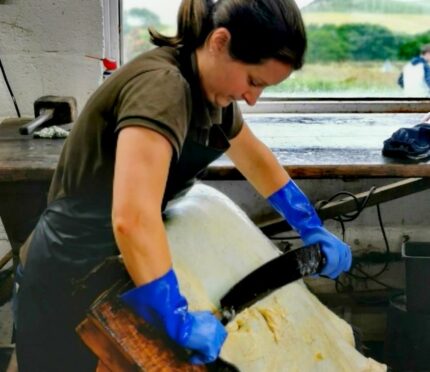The eyes of the world will be watching Scotland in the fight against climate change as Glasgow gears up to host next month’s United Nations COP26 conference, with the overarching goal of achieving net-zero – which is not only good for the planet, but also for your business.
To help support as many businesses as possible in their journeys, and to capitalise on the opportunities that are emerging within the green economy, Scotland’s enterprise agencies and public sector partners are working together to encourage businesses to take advantage of the sustainability support available across the business support landscape. With an online central hub of information hosted on netzeronation.scot, we have the resources and advice to support every sector.
Net-zero is a long-term vision and is aimed at reducing costs, minimising environmental impacts, building resilience, protecting your business from risks, and ensuring that it can respond to any challenges and opportunities in the future. By making small changes and working collectively, businesses can help Scotland to be a net-zero nation by 2045 and contribute to the green economy. With COP26 approaching, now is the time to act.
Here’s how one company in the Highlands and Islands is playing its part….
The Skye’s the limit – luxury without compromise
One company that has been committed to climate change since its inception in 1983 is Skyeskyns. Located in Skye’s coastal village of Waternish, the business produces the highest quality sheepskins. Skyeskyns had the foresight to operate sustainably from the beginning by using lamb skins that would otherwise be wasted. Now into its second generation of ownership, the Hartwell family is helping to steer the business through the challenges of the 21st century.
Looking after the land and resources
With the support of Highlands and Islands Enterprise, Skyeskyns has built upon its sustainable foundations and implemented various innovative initiatives across the company. From ethically sourcing its materials, amplifying its green power output, offsetting its carbon emissions and offering a refurbishment service, Skyeskyns’ ethos of looking after the land and its resources continually defines its choices.

Dave Till, General Manager, Skyeskyns said: ‘It’s impossible to live and work somewhere as beautiful as Waternish and not feel responsible for doing your bit to take care of the environment around you. Skyeskyns is rooted in the island landscape, and we recognise that we have a role, albeit a small one, to help protect that landscape for today’s and future generations.
“For those who wish to join the fight against climate change, there is help out there. The advisory support and variety of resources available at Highlands and Islands Enterprise were crucial in building our road map to net-zero.”
Nothing goes to waste
Skyeskyns sources its skins from the nearest abattoir, minimising transport miles, and preventing the skins being shipped overseas, ensuring wealth stays within the local economy. The company also uses offcuts from sheepskins to turn into other products, such as cushion fillers or building insulation, to ensure that nothing goes to waste.
In 2019, after successful trials, Skyeskyns moved away from using a mineral-based resource for tanning its sheepskins to using mimosa bark. In doing so, it has revived an ancient natural process that creates high-quality leather in the most sustainable way possible. Ultimately, everything produced within the mimosa tanning process is compostable and spread back onto its adjacent croft.

In 2021, Skyeskyns started using donations from customers (matched by the company) to begin a woodland project on the croft, not only offsetting the company’s own carbon emissions but also those of its customers. The company also recycles at every opportunity and uses green electricity suppliers at its tannery, visitor centre, and shop. Having invested in an electric delivery van, Skyeskyns installed an electric car charging point outside the tannery, which can also be used by locals and visitors alike.
Wherever you are on your journey to achieving net-zero, remember that there is support and resources available, as well as specialist advice, which can all be found on Scotland’s enterprise agencies.
Building a carbon neutral economy
Scotland is well-known for its entrepreneurial spirit, and it is vital that businesses across the country leverage this innovative strength to help make the all-important shift to build a carbon neutral economy. Starting your own journey to net-zero is not only an investment in the long-term profitability of your business but also means that you are doing your bit in helping Scotland’s ambitious climate targets.
Getting started can be as simple as implementing waste reduction and recycling schemes, using electric vehicles where possible, and setting up sustainable supply chains. The journey to net-zero will by no means be easy, but the long-term benefits that will ensue are unrivalled. New market opportunities, industry kudos, employee wellbeing, and increased staff retention are only some of the benefits that come from embarking on your journey.
We all have a responsibility to act, but we understand that many find it difficult to build a sustainable approach into their day-to-day practices and future strategies. A recent online survey found participants citing cost, lack of information, time, and resource constraints as key barriers to starting their own journey to net-zero.
Visit Net Zero Nation for more information on how you can contribute to the race to net-zero and start making changes today.
